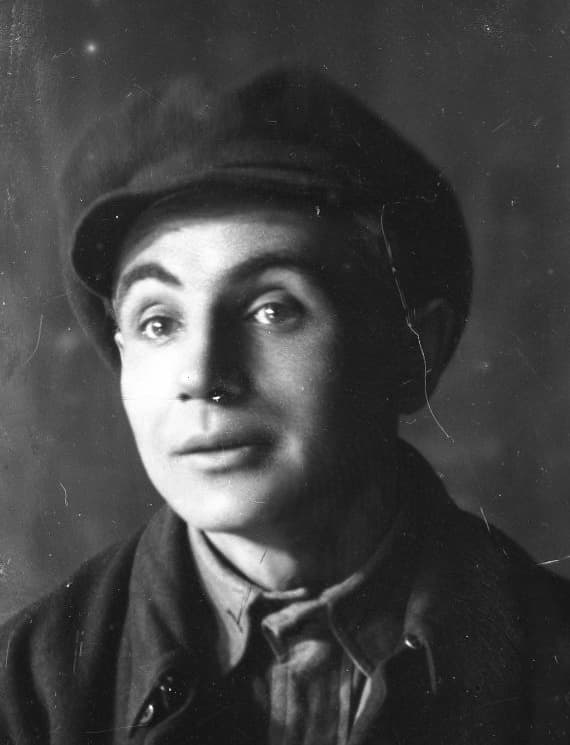Based on the play by Lesia Ukrainka
Premiere in Odesa: August 19
Premiere in Kyiv: December 3
Director: Les Kurbas
Artist: Stepan Hrechanyi
Richard Iron, Sculptor – Les Kurbas
Edita, His Old Mother – Olha Horodyska
Christabel, His Widowed Sister – Antonina Smereka
Davy, Kristabel’s Teenage Son – Halyna Prokhorenko
Jonathan, Sculptor, Richard’s Friend – Volodymyr Leontovych
Joshua Campbell, An Old friend of the Iron Family – Pavlo Dolyna
Joanna (Jenny), His Young Daughter – Sofiia Manuilovych
Rivers’s Wife – Polina Sarmiilenko
Godwinson, Teacher and Preacher – Semen Semdor
Caleb Peddinton, The Oldest Citizen in the Colony – Hnat Yura
The Most Respected Citizens in Massachusetts Colony:
Jeremiah Ortwin – Favst Lopatynskyi
John Mills – Oleksandr Yurskyi
Matthew Fielding – Stepan Bondarchuk
Abraham Smith – Yona Shevchenko
Magister, Teacher in Rhode Island – Volodymyr Kalyn
Bryde, Organist and Singing Teacher in Rhode Island – Andrii Shchepanskyi
Brooklie, Seamstress – Vera Shchepanska
Charlie, Richard’s Student – Olympiia Dobrovolska
Richard’s Second Student – Olena Rokytianska
Citizens of Rhode Island:
Mack Hardy – Les Piasetskyi
Jones – Vasyl Vasylko
O’Patrick – Oleksandr Yurskyi
Messier Antonio, Trade Ambassador from Venice – Valerii Vasyliev
Indian, Young Savage Girl – Halyna Ihrets
Les Kurbas staged Lesia Ukrainka’s dramatic poem In the Dense Forest at the Young Theater in 1918. Not all the members of the ensemble were enthusiastic when the director suggested doing this play. At the time there was widespread thought that Lesia Ukrainka’s plays were impossible to stage. Perhaps for Kurbas, who loved the Ukrainian poetess’s work, doing it was a personal creative challenge – one that he later considered not very successful. In the following season he wanted to stage Lesia Ukrainka’s Orgy and (according to theater critic Yurii Blokhyn, author of the first thorough study of the Young Theater) In the Catacombs, but his plans never materialized.
Actor Stepan Bondarchuk recalled that Kurbas didn’t resort to any special experiments: he created a realistic psychological show with strong synergy within the ensemble. “Lesia Ukrainka dedicated her dramatic poem In the Dense Forest to deep reflections on art, about the position and fate of the artist in an antagonistic society, about his role, place and responsibility in the struggle against reactions to higher ideals. These were issues that worried Les Kurbas and all of us, especially in those turbulent two years. We saw In the Dense Forest as our creative self-determination.”
After Black Panther and White Bear and Yola Kurbas remained concerned about the relationship between the artist and society and the artist and power – issues that were close to him throughout his creative life. The dramatic poem In the Dense Forest told the story of sculptor Richard Iron and his search for a place where “people can be free.” Les Kurbas played Iron. The critic in the newspaper Free Life wrote that Kurbas gave a vivid portrayal of the sculptor. “The tragedy of a soul with incomprehensible aspirations for the heights of art; the hostile attitude of stern Puritans, blind in their worldview to the foreign soul of art; ultimately, the death of the soul, the spiritual death of the actor who created the ‘stillborn’ work. All this was conveyed with true artistic inspiration by Mr. Kurbas.” Actress Polina Samiilenko recalled: “The talented Kurbas was able to convey the terrible ruin that is brought upon the artist by the disease of public and societal indifference. The fire in the artist’s eyes goes out, he whimpers, his hands hang down helplessly.”
Despite the play’s tragic finale, Kurbas ended the play on a life-affirming note. He left out the last two lines of Lesia Ukrainka’s dramatic poem in Richard’s final monologue. Her poem ended with Richard saying:
– That is an angel’s trumpet! That is a call from heaven!..
– When will the angel of death call me?
I hear I don’t have long to wait…
According to Stepan Bondarchuk, Kurbas wanted this ending to “affirm the victory of the progressive over the reactionary, life over death, the power of the artist’s spirit over decay.” That’s why he removed the last two lines of Richard’s final monologue, so that the play ended with the words:
– That is an angel’s trumpet! That is a call from heaven!..
“The victory of life over death,” wrote Polina Samiilenko,” “the strength of spirit over despair – that is how Kurbas ended his play as an actor and as a director.”
Actor Yona Shevchenko recalled that during In the Dense Forest Kurbas was actively working with the Young Theater actors on gesture technique. In the journal Theater Barricades he wrote: “But, searching for the secrets of gesture expression, an element that complements or replaces emotion, ‘Мол. Т.’ couldn’t stop with stylized gesture, always restrained and schematic; alive and violent, he couldn’t stay with gesture – it was a dead formula. Due to the dialectic of things, he came to the gesture of expression via certain laws of the nature of material.” This phase in Kurbas’s creativity includes Oles’s etudes, Yola, and partly In the Dense Forest. According to Polina Samylenko, during rehearsals Kurbas told her and other actors: “You see… you couldn’t convey even one percent in words what you showed to the audience with your gestures…”
The critic writing in Free Life also singled out the acting of Antonina Smereka as Christabel, Halyna Prokhorenko as Christabel’s son Davie (her acting was pleasantly different that that of other women in similar roles) and Olha Horodyska as the mother – although he said that she lacked life in her movements. Among the male cast, in addition to Kurbas as Richard, the critic singled out Semor as the hypocritical and greedy Godwinson and Hnat Yura as Caleb Peddinton: “Yura is an artist who knows the line between acting and exaggeration.” The critic likened the show to lightning in a gloomy sky.
Writing about his experience working on the production, Stepan Bondarchuk said that he and the other actors sought to realize the director’s principal idea: “We wanted to show the deception of the political Godwinsons of the time and the immature worldview of many Richards. But even then we knew honest fighters for the freedom and purity of human relations, worthy people who hadn’t yet developed a deep understanding of social and class contradictions and often paid for it with their lives, while remaining spiritually pure and sticking to their principles.”

